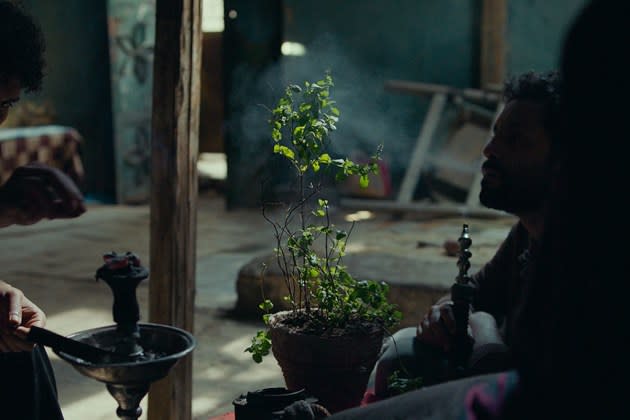‘Perfumed With Mint’ Review: A Languid, Visually Striking Work of Magical Realism

In his directorial debut “Perfumed With Mint,” Emmy-winning Egyptian cinematographer Muhammed Hamdy crafts a visually engrossing but narratively languid work of surrealism that captures generational discontent. Sandwiched between the striking images of its opening and closing salvos is a plateauing of meaning and form, lasting for extended periods — which is unfortunate, even though this stagnancy is, in essence, the point. While unlikely to hold the attention of even the most forgiving viewers throughout its runtime, it nonetheless features some of the most alluring visual poetry of any work at this year’s Toronto Film Festival, as an enrapturing elegy for the dead.
Through gradual lateral tracking shots for minutes at a time, Hamdy’s camera hovers over mint leaves near to the ground, as subdued prayers and whispers envelop his soundscape. This eerie, absorbing prologue soon gives way to the methodical introduction of Bahaa (Alaa El Din Hamada), a despondent doctor who treats a middle-aged woman for what she describes as an inability to let go of her dead son — whose spirit she sees everywhere she looks. Hamdy’s lengthy shots here capture a sense of spiritual crisis, and of people totally lost and adrift in the face of death.
More from Variety
'The Paradise of Thorns' Review: A Queer Thai Drama Takes a Turn for the Operatic
'Ick' Review: Brandon Routh Finds a New Way to Be Super in Joseph Kahn's Frenetic Monster Movie
TIFF Halts 'Russians at War' Documentary Screening After Threats to Safety
However, the movie only circles back to this careful unveiling of anguished hearts near the end. In the meantime, it tells a strange, phantasmagorical story set in abandoned Ciaro alleys, where Bahaa and his friend Mahdy (Mahdy Abo Bahat) — a troubled man growing mint leaves from his hair — abscond from disembodied shadows that give them chase. This mint affliction is common among Cairo’s youth, and is seemingly dulled by smoking hashish, which leads to an extended second act along the lines of an acerbic stoner comedy, albeit one wrapped in gorgeous and evocative use of light streaming through windows and pitch-black darkness, accentuating both spaces and emptiness.
Bahaa is also a lovelorn man, and he carries around a precious letter that, upon getting wet some time ago, never seems to dry. The scars of the past all manifest through subtle magical realism, as characters sit around and smoke while simply waiting to move undetected from one place to the next.
Hamdy’s skillful creation of mood is a double-edged sword. On one hand, even viewers entirely unfamiliar with modern Egyptian politics will likely glean meaning from his images. These are characters who, in approaching middle age, have lost all hope for the future, and remain on the run from encroaching fascistic phantoms. They would rather dull their pain through intoxication than face the dead. “Perfumed With Mint” is, in this way, a deeply political work that invites occasional curiosity from afar. For those clued in, it reflects the sheer exhaustion of the post-Arab Spring generation who inadvertently traded in one tyrant for another — Mohamed Morsi for Abdel Fattah el-Sisi — and have barely stopped protesting since.
On the other hand, this weary discontentment is so lucidly conveyed that it’s not hard to get on the movie’s wavelength early on — from which point the film seldom explores its own imagery, or transforms in meaning. Its lengthy lulls feature withdrawn, monotonous conversations with political bents, but everyone seems to talk around the same subjects from scene to scene. Some characters offer poetic asides, but these become part of a one-note exploration of national and cultural mood.
As it reaches its quiet climactic scenes, however, “Perfumed With Mint” finally achieves the aesthetic and thematic transformations it had been lacking. That Hamdy has created a film featuring so much wasted time feels oddly fitting for a story that ruminates on exactly this notion and how it hollows people out. When it blooms in its final act, it does so through moving, rigorous, tension-filled visual inquiries into what becomes of young people when their spiritual wounds aren’t allowed to heal, and when their calls to action seem more muted and distant with each passing political movement. It’s a film that requires deep and meditative patience, but it’s largely worth the wait.
Best of Variety
Sign up for Variety's Newsletter. For the latest news, follow us on Facebook, Twitter, and Instagram.

 Yahoo Lifestyle
Yahoo Lifestyle 